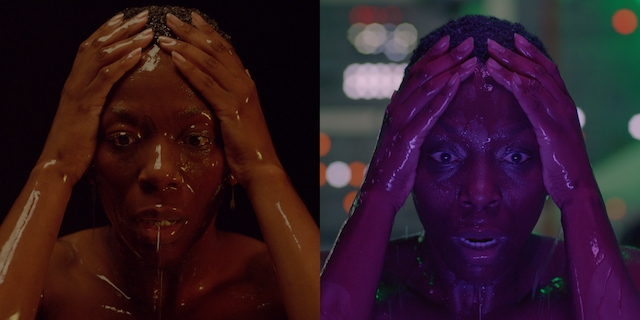For many today, the world seems backward. The right talks online about a ‘clown world’, dominated by liberal values in which everything is upside-down and absurd in equal measure. The left, meanwhile, mourns the election of those they see as clowns, wondering why their progressive ideas are not more popular. The question of perspective as such is left open: where we see things from is rarely itself explored. Art, on the other hand, is nothing other than a perspective on the world – it is here we see how we see, and take a step back, or closer, to understanding how the world, or the cosmos, is framed.
In Doppelgänger, Stan Douglas’s double square-format video installation (first presented at last year’s Venice Biennale), viewable in the dark from both sides, we are in the space-age proper: generic technology and a global cast take us out of, or at least beyond, contemporary partisan politics for a while. An astronaut, Alice, a black woman in her forties, is teleported to a distant planet (or, perhaps, through the looking glass). In one version of the story she returns to her space station with her colleagues; in the other, she arrives backwards, her organs on the wrong side of her body, her passwords reversed, her very being under suspicion: she is quarantined and put under guard, mistrusted as a potential ‘terrorist’ whose continued existence becomes a matter of speculation. The same people who greet her in one version fear her in another: your relation to others is always a matter of perspective and who decides if you’re in or out. The individual emotional psychologising of Andrei Tarkovsky’s 1972 Solaris is here transplanted to relations within groups.
Douglas’s film plays with questions of ethics – is Alice one or two? What is her relation to her double? Are they clones or sisters? – but more profoundly with questions of communication. When reversed, Alice gets a password ‘wrong’, spoken from the ‘incorrect’ side: to the question ‘if you measure your life by the tick of the clock’, instead of the answer ‘[you] live reified time’ she replies ‘emit deifier evil’; all correct words, certainly, but backwards. This simple act of miscommunication, as much of our dialogue with one another ultimately comprises, reflects the recto-verso paradox of perspective: there is no neutral position from which to judge. Douglas throws in a nod to quantum theory, as well as to the native-settler dynamic in North America, in a joke made by one of the space station crew, who compares the colonisers’ obsessions with ‘aliens’ to their inability to accept their own colonisation of North America.
Douglas the cinematographer is a consummate framer; everything is just so, from the lamp in the quarantine suite to the seatbelts and clipboard on the spaceship. The work’s form – forward-backward, looped, double-storied, paralleled but different narratives, clones, copies and reversals, issues of right and wrong – creates the overall impression of zero gravity, a nearweightless commentary on the absence of a centre. Doppelgänger reformulates Leibniz’s question ‘why is there something rather than nothing?’ as ‘why are there two things rather than one?’, and this double-sidedness then spins off into a cosmic fantasia with moments of stark beauty; not least in the images of celestial voids, double planets, a delightful soundtrack and kaleidoscopic images of space-parachutes landing into water. In viewing Alice’s two stories next to each other, we are made to understand that we are always opposite, or alien, to someone else, and they, in turn, are different to us. What is surprising is that we ever, left or right, see things the same way: perhaps we do not.
Stan Douglas, Doppelgänger, Victoria Miro Wharf Road, London, 31 January – 14 March 2020
From the March 2020 issue of ArtReview
